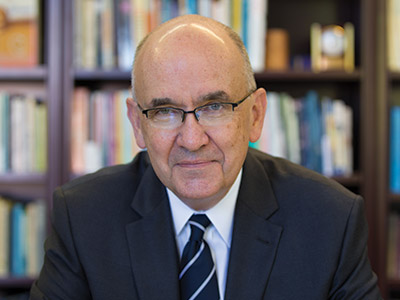President David Esterline Chairs Global Forum of Theological Educators
For the last several years, David Esterline has provided leadership as part of a group of theological educators from around the world with a vision for a new kind of conference. Their vision, developed together over time and across nations, came to full fruition in 2016, when the first Global Forum of Theological Educators met in Dorfweil, Germany—with some 86 participants from 37 countries. Their May 2019 meeting in Greece marked the second such gathering, with plans for meeting next in South Korea, followed by a fourth conference on the African continent and every two or three years going forward. As founding co-chair and now sole chair of the GFTE, Dr. Esterline, PTS president and professor of cross-cultural theological education, notes the participants’ “great energy and enthusiasm for continuing” the meetings, which are unique outside North America’s Association of Theological Schools in the United States and Canada.
“As we developed the idea for the GFTE, we knew we wanted to involve theological educators from all six major Christian ecclesial families—Orthodox, Roman Catholic, Historical Protestant, Evangelical, Pentecostal, and Independent (primarily from Africa and China). Our aim was not to establish another academic conference, but instead to provide an opportunity for leaders in Christian theological education to meet and learn from those doing similar work but whose faith tradition is different from their own—to provide a common platform for building trust across traditional boundaries, sharing experiences, and exploring commitments and areas of for potential collaboration.”
He adds, “Participants in the GFTE engage as individuals rather than as formal representatives of particular groups, institutions, or associations,” and the meetings are set up to nurture that posture.
“To ensure balanced representation of each of the Christian ecclesial families at the GFTE’s meetings, participation in them is by invitation only,” Dr. Esterline explains. And to foster both continuity and new energy, about half the participants in the first GFTE gathering were invited participants in the 2019 meetings, while the other half were new to the group. “This approach allows us to involve people who are open to hearing from global colleagues speaking from the perspective of different Christian traditions—who are ready to listen across ecclesial lines,” he notes.
The meetings of the GFTE are formed largely around daily plenary worship, followed by Bible studies led by participants of various traditions, and then follow-up roundtable discussions. “For these discussions, we assign seating to ensure dialogue that reflects the range of ecclesial families,” says Dr. Esterline, “and these roundtable discussions are what the participants indicate they value and enjoy the most, in addition to the Bible studies themselves.”
As to the outcome of the GFTE so far, its success has exceeded Dr. Esterline’s expectations. “By the second day of our recent meetings in Greece, the members of the planning committee (composed of members from each of the six ecclesial families) were already certain we should continue the Forum on an ongoing basis. ‘It’s really a thing,’ as one person put it.” Particularly striking to Dr. Esterline was the conclusion of one participant—a Roman Catholic and full professor in the U.S.—who said of her experience in the GFTE that she feels she’s found a theological home, one with believers from very different traditions. “Her ready recognition of Christian brothers and sisters from other ecclesial traditions encapsulates the foundational commitments of the GFTE, namely, that we are one family in Christ and that we have much both to learn from and contribute to each other’s ministries as Christian theological educators.”

